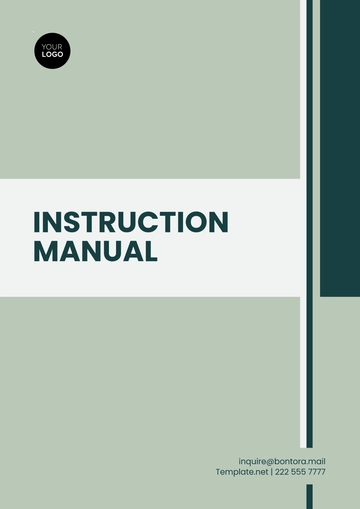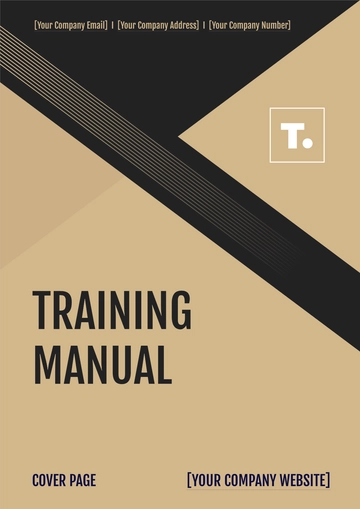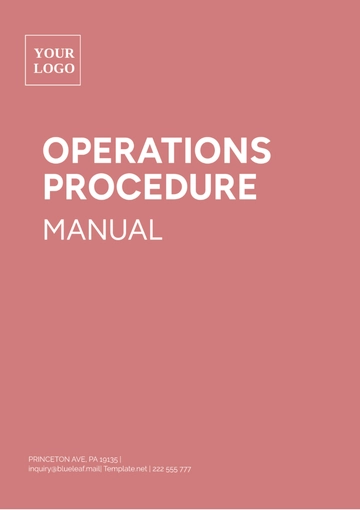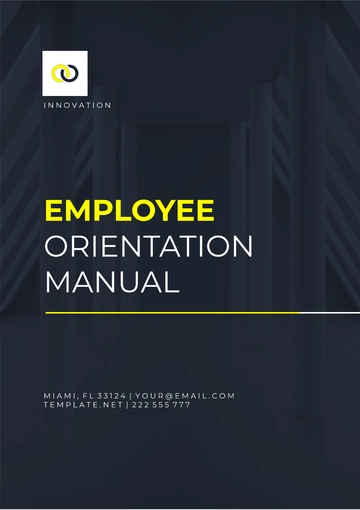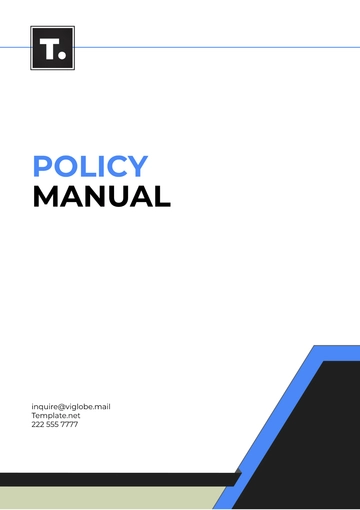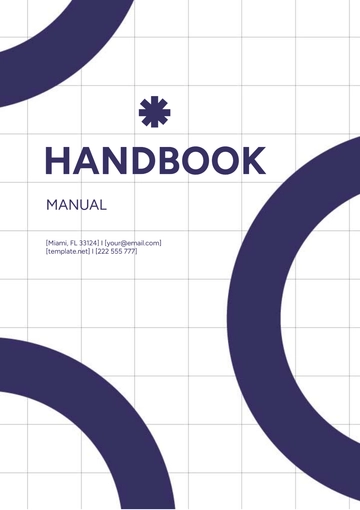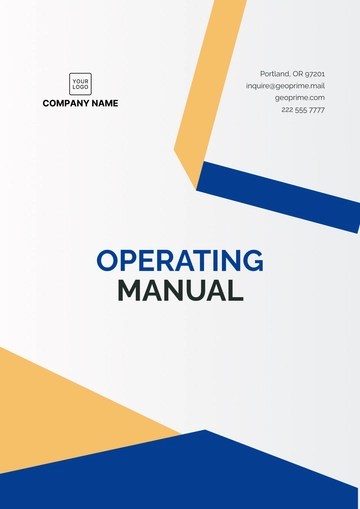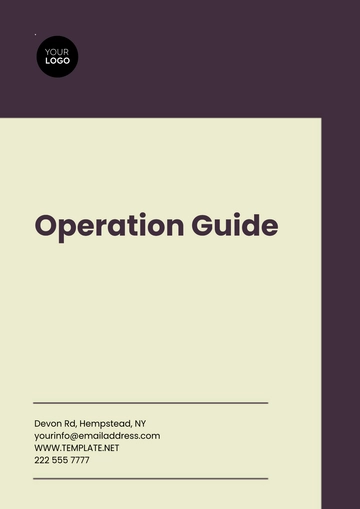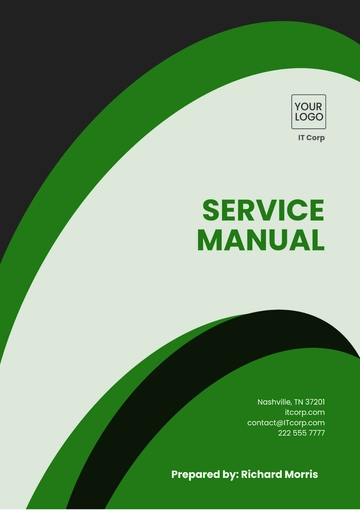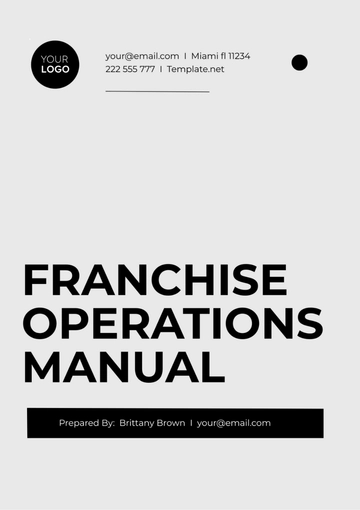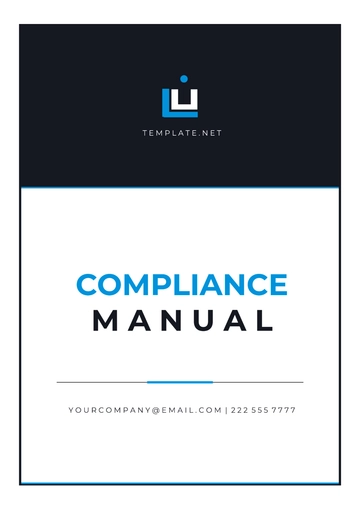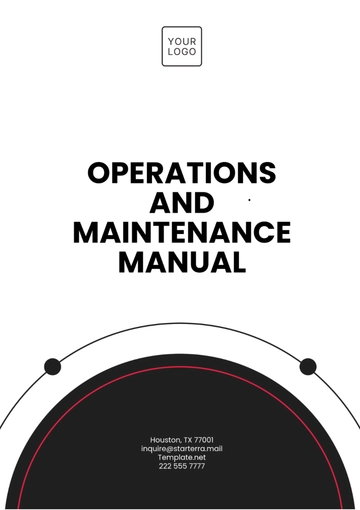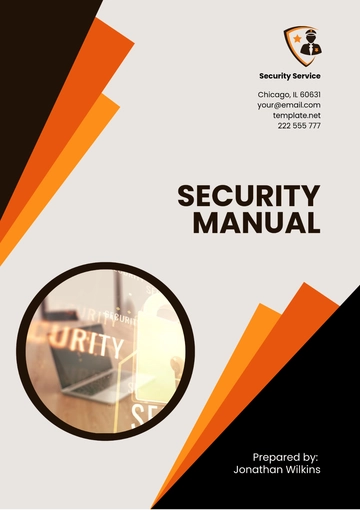Free Church Manual
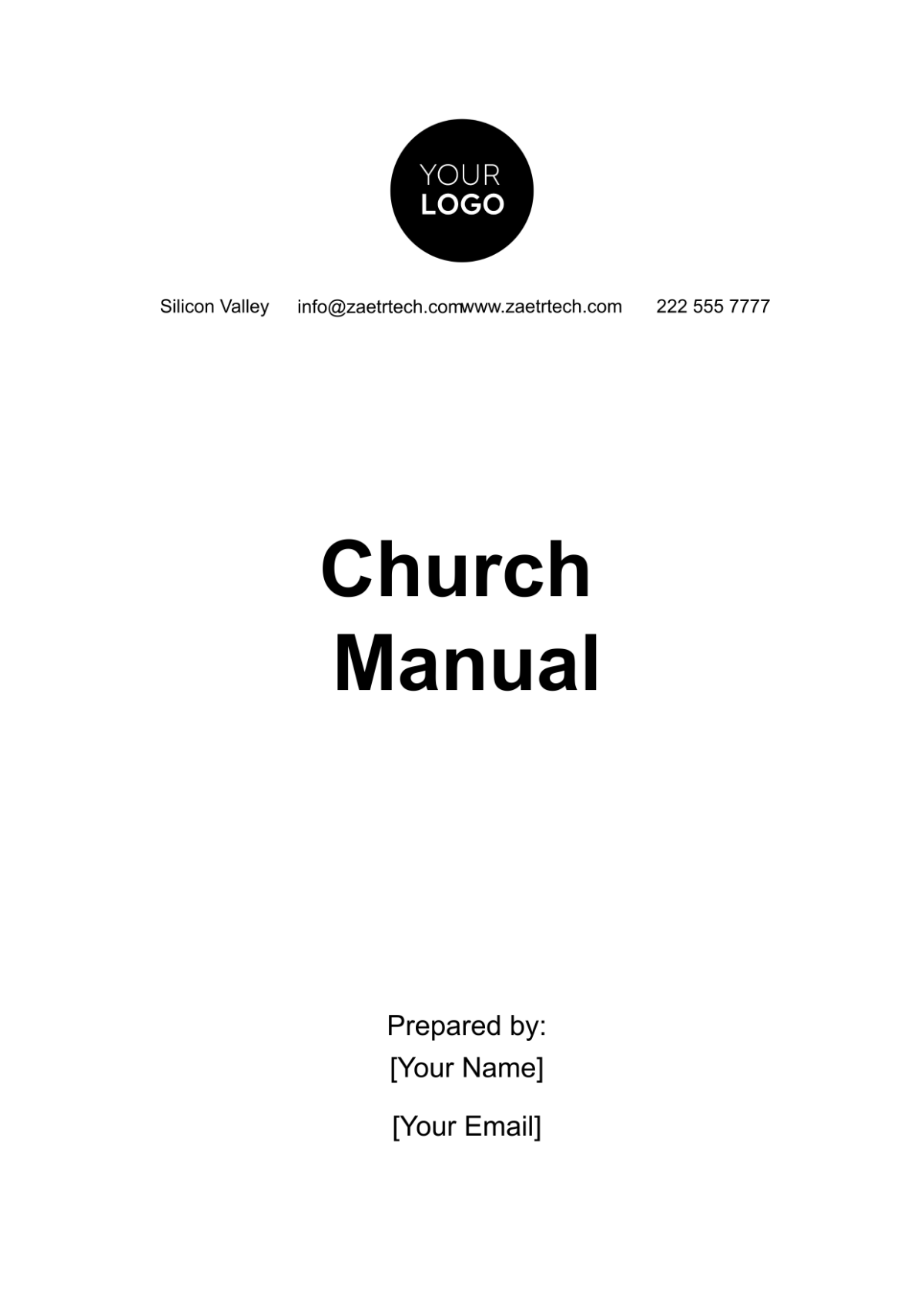
I. Introduction
The [Your Company Name] Church Manual provides a comprehensive guide for the operations, governance, spiritual leadership, and ministry efforts within our church community. As we advance into the year [2050] and beyond, this manual serves as a framework for all church activities to ensure that they are conducted in a manner that aligns with biblical teachings, best practices in governance, and the specific mission and vision of [Your Company Name]. This document also ensures accountability, transparency, and spiritual growth across all church departments. The structure is designed for clarity and easy reference, with detailed sections on governance, worship, ministries, and member relations.
The overarching mission of our church is to glorify God through worship, preaching, teaching, and community outreach. In a rapidly changing world, this manual serves as a guiding resource, facilitating our efforts to remain grounded in our faith while effectively meeting the needs of our congregation and community.
II. Church Governance
A. Leadership Structure
1. Pastor and Elders
The church shall be led by a team comprising the Senior Pastor and a board of Elders. The Senior Pastor is the primary spiritual leader responsible for preaching, teaching, and guiding the church's vision. The Elders are tasked with offering support and counsel to the pastor, while also overseeing the spiritual wellbeing of the congregation.
1.1 Pastor's Role
The pastor is responsible for preaching and teaching biblical truths, shepherding the congregation, and representing the church in the community. This includes weekly sermons, pastoral care, conducting weddings, baptisms, and funerals. The pastor also leads the church in prayer and encourages spiritual growth among members through various educational programs.
Sermon Preparation: The pastor dedicates significant time to prayer and research to prepare biblically grounded sermons that are relevant to the congregation’s needs. This involves studying scripture, theological texts, and current issues facing the community.
Pastoral Care: The pastor is available for one-on-one counseling sessions with congregants, providing spiritual guidance, support during crises, and facilitating healing for those facing life challenges.
1.2 Elders’ Responsibilities
The Elders ensure the church remains doctrinally sound. They assist in overseeing church activities, ensuring that programs reflect the church's mission. Elders also provide spiritual care, counsel, and mentoring to church members.
Spiritual Oversight: Elders are responsible for the overall spiritual health of the congregation. They conduct regular check-ins with various ministry leaders and facilitate prayer meetings to seek God’s guidance for the church.
Conflict Resolution: When conflicts arise within the church, the Elders are called upon to mediate disputes, ensuring that the resolutions align with biblical principles and fostering a spirit of reconciliation.
2. Deacon Board
The Deacon Board supports the church in administrative tasks and ensures that church ministries operate smoothly. The board also helps in facilitating church events, maintaining the church facility, and overseeing the church's financial health.
Support Ministries: Deacons are often assigned specific areas of ministry, such as hospitality, outreach, or care for the sick. They are tasked with meeting the practical needs of the church and its members.
Event Coordination: Deacons assist in planning and executing church events, including potlucks, retreats, and community service days, ensuring that all logistical aspects are managed effectively.
B. Church Committees
1. Finance Committee
The Finance Committee is responsible for preparing the church's budget, tracking financial transactions, and ensuring that funds are allocated responsibly. They also oversee the collection of tithes and offerings, financial reporting, and audits.
Budget Planning: The committee meets annually to draft a budget that aligns with the church’s goals and priorities. This includes anticipated income from tithes and offerings, as well as expected expenses for ministries and operational costs.
Financial Reporting: Monthly reports are generated to provide transparency to the congregation regarding financial health. These reports outline income, expenditures, and variances from the budget.
2. Worship Committee
The Worship Committee oversees the planning and execution of worship services. This includes working with the music team, preparing the sanctuary, organizing volunteer ushers, and ensuring all technical aspects, such as sound and video, are functioning correctly.
Service Planning: Committee members meet regularly to plan upcoming worship services, selecting songs, scriptures, and themes that reflect the church’s seasonal focus.
Training Worship Leaders: The committee is responsible for the training and development of worship leaders and musicians, ensuring they have the resources and skills needed to lead the congregation effectively.
3. Missions Committee
The Missions Committee ensures that the church fulfills its call to reach out to the world. They are responsible for coordinating local and international mission efforts, organizing evangelistic events, and managing relationships with mission partners.
Mission Strategy: This committee develops strategies to engage the church in mission work, evaluating potential partnerships and initiatives that align with the church’s mission.
Reporting and Feedback: The committee maintains regular communication with missionaries supported by the church, gathering updates and providing feedback to the congregation on the impact of their support.
III. Church Membership
A. Becoming a Member
Membership in [Your Company Name] Church is open to any believer in Jesus Christ who has publicly confessed their faith and completed a membership class.
Membership Class
Prospective members must attend a membership class that covers the church’s history, mission, statement of faith, and membership responsibilities. At the end of the class, participants will have the opportunity to meet with the pastor or Elders for a personal interview.
Class Format: The membership class consists of four sessions, each lasting [90 minutes]. Each session includes teaching, discussion, and Q&A to ensure participants fully understand the expectations and values of the church.
Personal Interview: After completing the class, each participant meets with a pastor or Elder to discuss their faith journey, address any questions, and provide a personal testimony.
Membership Responsibilities
Members are expected to:
Regularly attend worship services.
Participate in church activities and ministries.
Offer financial support through tithes and offerings.
Live in a manner that reflects the teachings of Jesus Christ.
Commitment to Fellowship: Members are encouraged to engage in small groups or Bible studies to foster community and spiritual growth, as well as to build relationships within the church.
B. Member Rights
As members of [Your Company Name] Church, individuals have the right to:
Participate in decision-making meetings, such as church business meetings.
Serve in church leadership roles.
Access pastoral care and counseling.
Voting Rights: Members have voting rights during business meetings to approve budgets, elect Elders, and make significant church decisions. Each member's voice is valued and heard.
IV. Worship Services
A. Structure of Worship
Worship services are held weekly, on Sundays at 10:00 AM and 6:00 PM. Services include the following elements:
Praise and Worship
The music team leads the congregation in worship through contemporary Christian songs and traditional hymns. Worship is central to creating an atmosphere of reverence and connection with God.Diversity in Worship: The church embraces a blend of musical styles to engage different generations and cultural backgrounds. This diversity reflects the rich tapestry of the congregation.
Prayer
Corporate and individual prayer is encouraged throughout the service. The pastoral team is available to offer prayer for individuals during the service, and an altar call is held at the end for those seeking deeper spiritual connection.Prayer Teams: Trained prayer teams are available to pray with individuals both during and after the service, providing a space for personal ministry and support.
Sermon
The pastor delivers a [45]-minute sermon focused on biblical exposition, contemporary applications, and personal growth. Sermons are recorded and made available on the church website for members unable to attend.Sermon Series: The pastor often organizes sermon series that focus on specific themes or books of the Bible, allowing for in-depth exploration of scripture over several weeks.
Communion
The church celebrates communion on the first Sunday of each month, inviting all believers to participate in remembrance of Christ’s sacrificePreparation for Communion: The church encourages members to prepare their hearts through prayer and reflection before partaking in communion, fostering a deeper understanding of its significance.
B. Special Services
In addition to weekly services, [Your Company Name] Church holds the following special services:
Easter and Christmas Services
These major Christian holidays are celebrated with special worship events, featuring expanded music programs, children’s performances, and dramatic presentations of the biblical story.Community Outreach: Special services often include outreach efforts, inviting the community to attend and participate in the celebration of these significant seasons.
Baptismal Services
Baptism is a public demonstration of faith. The church holds quarterly baptismal services where individuals can be baptized after completing a preparatory class on its meaning and significance.Baptism Classes: Classes are offered to explain the theology of baptism and provide participants with an opportunity to share their testimonies, ensuring they understand the importance of this sacrament.
V. Ministries
A. Children’s Ministry
The Children’s Ministry serves children aged [3 to 12]. Its goal is to teach children about Jesus in a fun and engaging environment, using Bible lessons, crafts, and interactive activities.
Sunday School
Children attend age-appropriate Sunday School classes during the regular worship services. Lessons are designed to introduce basic biblical concepts and encourage spiritual growth.Curriculum Development: The curriculum is regularly reviewed and updated to include current cultural relevance and effective teaching methods. Teachers are trained to engage children actively.
Vacation Bible School
Each summer, the church hosts a week-long Vacation Bible School program that includes games, crafts, songs, and Bible lessons. This event is open to children from the community, providing an opportunity to introduce new families to the church.Volunteer Opportunities: Members of the congregation are encouraged to volunteer for this program, creating a vibrant atmosphere of community involvement and mentorship.
B. Youth Ministry
The Youth Ministry caters to students aged [13 to 18], focusing on their spiritual development, leadership skills, and community involvement.
Weekly Youth Group
The youth group meets weekly for Bible study, fellowship, and fun activities. This time allows students to explore their faith and build relationships with peers and mentors.Retreats and Conferences: Throughout the year, the youth ministry organizes retreats and conferences that focus on spiritual growth, leadership development, and outreach.
Service Projects
Youth group members participate in community service projects throughout the year, helping to instill a sense of responsibility and compassion for those in need.Partnerships with Local Organizations: The youth ministry collaborates with local nonprofits to facilitate meaningful service opportunities that enhance the community and encourage active participation in outreach.
C. Adult Ministries
Adult ministries provide a variety of programs designed to support spiritual growth, fellowship, and service among adults of all ages.
Small Groups
Small groups meet throughout the week to foster deeper connections among members, facilitate Bible study, and support accountability in spiritual growth.Group Diversity: Groups are formed based on demographics, interests, and life stages to encourage participation and connection. This includes groups for men, women, singles, and couples.
Men’s and Women’s Ministries
Dedicated ministries for men and women offer opportunities for fellowship, teaching, and service. Events include retreats, Bible studies, and social gatherings designed to strengthen bonds among members.Mentorship Programs: Both ministries provide mentorship opportunities, connecting older members with younger ones for guidance and support in their spiritual journeys.
D. Community Outreach
The church is committed to reaching out to the local community through various programs and initiatives aimed at sharing the love of Christ and meeting the needs of residents.
Food Pantry
The church operates a food pantry that provides non-perishable food items to individuals and families in need within the community. This ministry relies on donations and volunteers from the congregation.Collaboration with Local Agencies: The food pantry collaborates with local agencies to ensure families have access to necessary resources and support services.
Health and Wellness Programs
Regular health and wellness events, including seminars, screenings, and fitness classes, are organized to promote healthy lifestyles and holistic care for community members.Resource Sharing: The church provides information about community resources and support systems available for individuals seeking assistance in various aspects of life.
VI. Spiritual Growth and Discipleship
A. Biblical Education
Biblical education is at the heart of [Your Company Name] Church, ensuring that members grow in their knowledge of the Scriptures and develop a deeper relationship with God.
Bible Studies
Various Bible study classes are offered throughout the week, catering to different age groups and interests. These studies provide an opportunity for in-depth exploration of biblical texts and principles.Discussion-Based Learning: Classes utilize discussion-based formats to encourage participation and application of biblical truths to everyday life.
Discipleship Programs
The church offers discipleship programs designed to equip members with tools for spiritual growth, including prayer, Scripture memorization, and practical applications of faith.Mentorship Relationships: Members are encouraged to find mentors within the church who can provide guidance and accountability in their spiritual journeys.
B. Prayer Ministry
The Prayer Ministry is a vital aspect of church life, focusing on cultivating a culture of prayer among members and engaging in intercessory prayer for the needs of the congregation and community.
Prayer Meetings
Regular prayer meetings are held, inviting all members to join together in seeking God’s will for the church and its ministries. These gatherings are characterized by communal prayer, worship, and sharing of testimonies.Online Prayer Requests: An online platform is available for members to submit prayer requests, ensuring that all needs are addressed and prayed for.
Prayer Partners
The church encourages members to form prayer partnerships, allowing individuals to support one another through regular prayer and encouragement.Prayer Retreats: Occasional prayer retreats provide members with dedicated time to focus on prayer, worship, and listening to God’s voice.
VII. Communication
A. Internal Communication
Effective communication is essential for the smooth operation of church activities and programs.
Weekly Announcements
During worship services, weekly announcements are made to inform the congregation about upcoming events, volunteer opportunities, and prayer requests. Announcements are also posted on the church’s website and social media platforms.Visual Aids: Screens in the sanctuary display announcements to ensure all members are informed and engaged.
Newsletters
A monthly newsletter is distributed via email, providing updates on church activities, stories of impact, and spiritual encouragement.Member Contributions: Members are encouraged to contribute testimonials, prayer requests, and stories of how God is working in their lives.
B. External Communication
The church seeks to maintain an active presence in the community through effective outreach and engagement.
Social Media Engagement
The church utilizes social media platforms to connect with both members and the broader community, sharing messages of hope, event information, and spiritual resources.Content Strategy: Regular content is created to engage different demographics, including inspirational posts, event highlights, and live-streamed services.
Community Events
The church hosts various events open to the community, providing opportunities for engagement and relationship-building. These events include holiday celebrations, festivals, and free workshops, allowing the church to foster connections with local residents and share the gospel.Collaborative Efforts: The church partners with local organizations to promote these events, ensuring a wide reach and a greater impact.
VIII. Global Missions
A. Mission Partnerships
The church is committed to supporting global missions through prayer, financial support, and sending short-term mission teams.
Partnership with Missionaries
The church maintains partnerships with missionaries and organizations around the world, providing ongoing support and engagement through prayer and financial contributions.Regular Updates: Members receive regular updates from missionaries regarding their work and prayer needs, fostering a connection between the congregation and mission fields.
Training for Missions
Workshops and training sessions are held for members interested in participating in missions, preparing them for cultural sensitivity, effective communication, and practical skills for ministry.Cultural Awareness: Training includes cultural immersion experiences and education on the specific needs of the communities served.
B. Short-Term Missions
Each year, the church organizes a short-term mission trip to a selected location, allowing members to engage in hands-on ministry. Participants are trained and prepared to effectively share the love of Christ in diverse contexts.
Selection of Mission Destinations
The Missions Committee selects destinations based on prayerful consideration of where the church can make a significant impact and support ongoing work.Application Process: Interested members must complete an application and participate in preparatory meetings to ensure readiness for the mission experience.
Post-Trip Debriefing
After each mission trip, a debriefing session is held to allow participants to share experiences, reflect on their journey, and encourage others to consider future missions.Integration of Experiences: Participants are encouraged to share their experiences within their small groups, fostering a culture of mission-mindedness within the congregation.
- 100% Customizable, free editor
- Access 1 Million+ Templates, photo’s & graphics
- Download or share as a template
- Click and replace photos, graphics, text, backgrounds
- Resize, crop, AI write & more
- Access advanced editor
Create a comprehensive resource with the Church Manual Template from Template.net. This editable and customizable template provides guidelines for church operations and procedures. Customize it in our Ai Editor Tool to reflect your community’s values. Guide your congregation—develop a complete church manual now!
